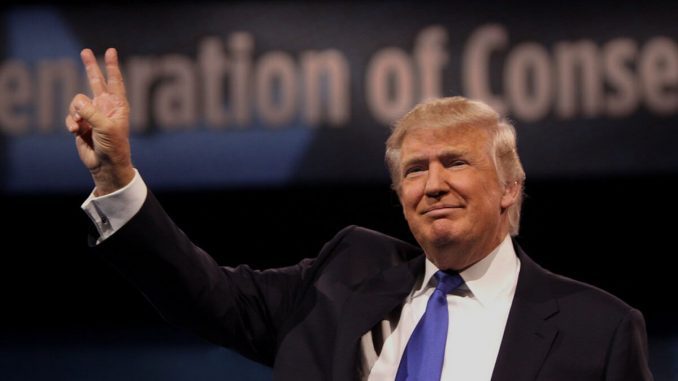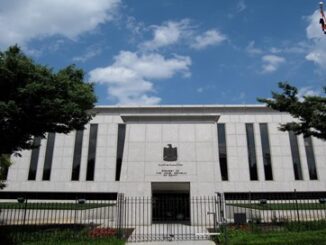
Many of the US allies supported its military action against Assad regime in Syria in response to the deadly chemical attack in Idlib last week. However, not all of them were keen to take part personally in future similar actions.
In a sharp escalation of the U.S. military role in Syria, two U.S. warships fired dozens of cruise missiles from the eastern Mediterranean Sea at the airbase controlled by Assad regime forces in response to the deadly poison gas attack in a rebel-held area on Tuesday, U.S. officials said.
Fifty-nine Tomahawk missiles were launched from the USS Porter and USS Ross around 8:40 p.m. EDT, striking multiple targets – including the airstrip, aircraft and fuel stations – on the Shayrat Air Base, which the Pentagon says was used to store chemical weapons.
The Pentagon also said it believes the strike has “severely damaged or destroyed Syrian aircraft and support infrastructure”.
The U.S. cruise missile attack was a “one-off,” a U.S. defense official told Reuters, meaning it was expected to be a single strike with no current plans for escalation.
Trump ordered the strikes just a day after he pointed the finger at Assad for this week’s chemical attack.
“Tonight I ordered a targeted military strike on the airfield in Syria from where the chemical attack was launched.”
“It is in this vital national security interest of the United States to prevent and deter the spread and use of deadly chemical weapons.”
“There can be no dispute that Syria used banned chemical weapons, violated its obligations under the chemical weapons convention and ignored the urging of the UN security council.”
“Years of previous attempts at changing Assad’s behavior have all failed and failed very dramatically,” Trump said on Thursday.

Australia ready to take part
Australian prime minister said the attack “cries out” for a strong response and that Russia had to take some responsibility, and hinted that Australia may be involved in an expanded US-led military strike on Syria.
“I can’t go into any more detail than that, other than to say that I’ve spoken only a little while ago with the defense minister [Marise Payne] and the chief of the defense force [Mark Binskin]” he told 3AW radio on Friday.
“You know where we stand. We have condemned this attack utterly. It cries out for a strong response and we are in very … close and constant communication with our allies, in particular, the United States.”
He later confirmed the United States had briefed Australia on Friday prior to the US military strike.
Payne also called on the UN security council to take action but cautioned that “we need to be very careful” about the complexity of the Syrian conflict.
“We have to be clear with Russia, with have to be clear with those who support the regime, that this is totally unacceptable,” she said.
“The UN security council, I understand, is considering the options that are available to it. We would call on them to take action in response to that.”
The US vice-president, Mike Pence, is due to visit Australia this month. Pence will fly in on 22 April, as part of a regional tour of Asia-Pacific countries including South Korea, Japan, and Indonesia.
The foreign minister, Julie Bishop, says Pence’s visit underlines the importance of the Australia-US alliance.
“Vice-President Pence’s visit provides an important opportunity to discuss the depth and breadth of Australia’s strategic, security and economic relationship with the United States, and to underline our commitment to work with the Trump administration to advance our shared interests in our region and globally,” she said.
Britain is hesitant
The British government was not asked to provide military support to the US attack on Syria but believes it was a “wholly appropriate” response to the deadly use of chemical weapons on civilians, the defense secretary, Michael Fallon, has said.
Fallon said the UK would not get directly involved in any action with combat troops or aircraft in Syria without parliamentary approval.
But while he made clear that the decision to launch dozens of missiles on to a Syrian airbase in the early hours of Friday was a US one, he said Britain believed it was the right move.
“We fully support this strike, it was limited, it was appropriate, and it was designed to target the aircraft and the equipment that the United States believe were used in the chemical attack and to deter President [Bashar al-]Assad from carrying out future chemical attacks,” Fallon said.
He urged Russia to learn a lesson from the action, suggesting President Vladimir Putin was the key figure to end the war. “It is Russia that has the influence over the regime that can … bring this slaughter to a stop.”
Speaking on BBC Radio 4’s Today program on Friday, Fallon revealed there had been “close discussions” with the US administration since chemical weapons were dropped from warplanes on Tuesday, killing dozens of civilians, including children, in Idlib province.
He said his American counterpart, James Mattis, had phoned him to share the US assessment of the regime’s culpability, and that the UK was later informed of Trump’s final decision to take action.
The UK foreign secretary, Boris Johnson, also expressed his support on Twitter, writing: “Fully support US action after deplorable chemical attacks.”
The Syrian crisis began as a peaceful demonstration against the injustice in Syria. Assad regime used to fire power and violence against the civilians and led to armed resistance. 450.000 Syrians lost their lives in the past five years according to UN estimates, and more than 12 million have lost their homes.



